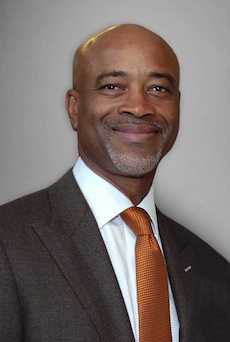
December 18, 2020
While health systems and their front line teams have been braving the devastation of COVID-19 with caring hearts and dedicated skill, researchers around the globe have been working tirelessly to develop vaccines to combat the deadly virus that has stolen more than 1.5 million lives since the spring of this year.
In the midst of the darkest days, it was difficult to imagine how it would feel the moment safe vaccines were more than just a distant possibility.
And when the glimmering vials of hope arrived at my health system one cold morning, I found myself overjoyed and conflicted all at the same time.
As a CEO of a major health system, I have always felt a deep responsibility for the health and well-being of our team and our community. Navigating the pandemic without a proven playbook, with more questions than answers, and with days of despair when our best efforts didn’t yield the intended outcomes for those we were caring for, has been humbling. From scouring the globe for available personal protective equipment to keep the front line team members safe, to making heart wrenching decisions to restrict families from their loved ones during their most vulnerable moments, there have been many challenges and emotional moments.
Yes, a safe vaccine in hand with a second one on its heels is beyond a moment worthy of celebration.
So, why the conflict?
Dennis W. Pullin
Well, it came from a statement posed by a colleague I encountered in a meeting the very day the vaccine arrived.
Her concern centered on safety and trust. Safety, I explained, has been a key concern among health officials and experts. I confidently shared with her that no major safety concerns were uncovered in the U.S. Food and Drug Administration's review of Pfizer's vaccine. I also shared that some participants did experience temporary side effects that are in line with those people experience from other vaccines, including the flu shot. I told her what has been told to me – that any reactions signal that the vaccine is teaching the immune system how to handle something before you actually encounter it – which, hopefully you never will.
Then I realized that it wasn’t the safety of the vaccine that she didn’t trust. As a person of color, she just didn’t trust.
Skepticism surrounding the vaccine is widespread in communities of color who have suffered disproportionately from the coronavirus. This country's history of unethical experimentation on people of color has created understandable concern.
This colleague went on to tell me that she needed to see "people who looked like her" receiving the vaccine. Better yet, people of color and of influence who would be in the know receiving this vaccine would temper her hesitation.
As a black CEO, I realize I am that person she describes – that person of color and of influence who is "in the know." I am compelled to join my clinical colleagues, including nurses, physicians and frontline caregivers of color, and lead by example. But, I don’t get to jump the line. I know the facts and I will be getting the vaccine as quickly as possible after all of the prioritized, higher-risk, patient-facing heroes have received theirs. It's an easy decision for me and one I want people to understand.
I realize the remarks of this one colleague represented so much more than her individual fears. She was sharing the apprehension of many. She was asking me, without asking me, to remember that. She reminded me that I, and others like me, carry an extra responsibility to be purposeful in our actions and bring others along whenever we can.
After nine months leading 15,000 courageous, resilient colleagues, there is nothing I wouldn't do to show them leadership, confidence and support. I understand all too well the alternative to this vaccine, and it’s grim. As the coronavirus oppocontinues to threaten all people, and those of color most, dispelling skepticism is critical and my role is key. I am not a caregiver or a front line hero, but I represent them and I will not let them down.
I will not be first, but I will be early, and I will talk boldly about the safety, effectiveness and importance of vaccinations to everyone, especially specific populations who need to see "people like me." I will use my role to be a force for equality in medicine, and as we eliminate health disparities, we will slowly and steadily build trust through the consistency of our actions.
